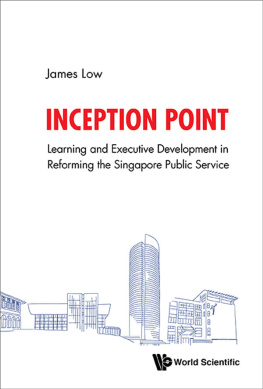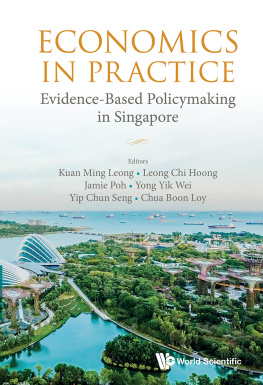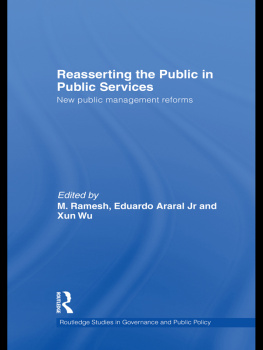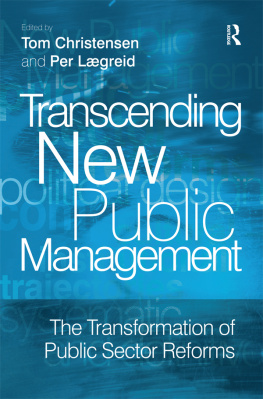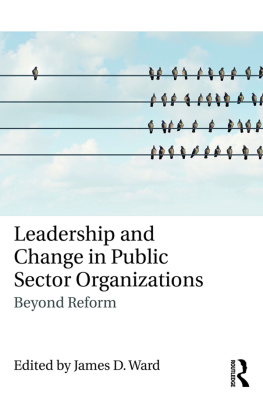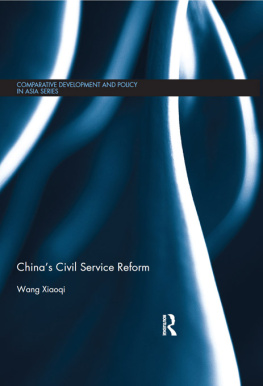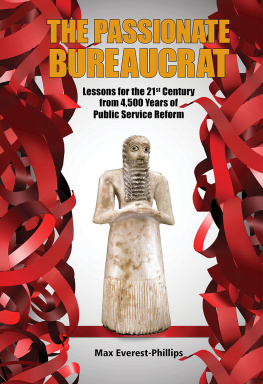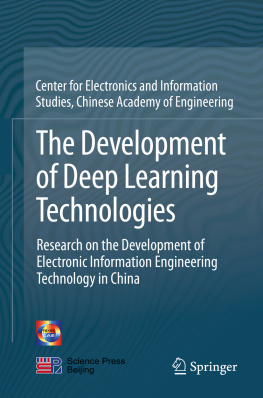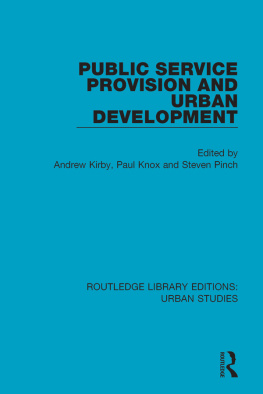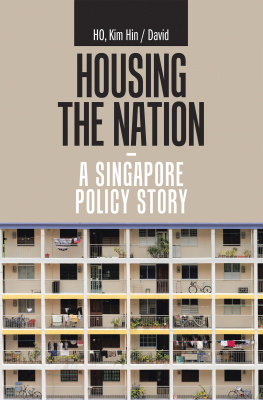Published by
World Scientific Publishing Co. Pte. Ltd.
5 Toh Tuck Link, Singapore 596224
USA office: 27 Warren Street, Suite 401-402, Hackensack, NJ 07601
UK office: 57 Shelton Street, Covent Garden, London WC2H 9HE
Library of Congress Cataloging-in-Publication Data
Names: Low, James (Civil servant), author.
Title: Inception point : the use of learning and development to reform the
Singapore Public Service / James Low.
Description: New Jersey : World Scientific, [2018] | Includes bibliographical
references and index.
Identifiers: LCCN 2017049050 | ISBN 9789813235069 (hardcover)
Subjects: LCSH: Singapore--Officials and employees--In-service training. |
Singapore--Officials and employees--Training of. | Civil
service--Singapore--History. | Civil service reform--Singapore--History.
Classification: LCC JQ1063.A69 L96 2018 | DDC 362.6/3095957--dc23
LC record available at https://lccn.loc.gov/2017049050
British Library Cataloguing-in-Publication Data
A catalogue record for this book is available from the British Library.
Copyright 2018 by World Scientific Publishing Co. Pte. Ltd.
All rights reserved. This book, or parts thereof, may not be reproduced in any form or by any means, electronic or mechanical, including photocopying, recording or any information storage and retrieval system now known or to be invented, without written permission from the publisher.
For photocopying of material in this volume, please pay a copying fee through the Copyright Clearance Center, Inc., 222 Rosewood Drive, Danvers, MA 01923, USA. In this case permission to photocopy is not required from the publisher.
For any available supplementary material, please visit
http://www.worldscientific.com/worldscibooks/10.1142/10850#t=suppl
Desk Editor: Karimah Samsudin
Typeset by Stallion Press
Email:
Printed in Singapore
Preface
I was on a consultancy in a Southeast Asian country in 2003 when a local civil servant told me, If only we had Lee Kuan Yew, we will be as successful as Singapore.
Conversations with foreign officials since did span beyond a single leader in explaining Singapores transformation effective governance, economic strategies, the early embrace of infocommunication technologies (ICT), and so on. Reforming the bureaucracy was an engaging topic too, from growing policy-making capacities to using case studies for realistic training. However, reforming the bureaucracy rarely featured as a factor in modernising developing countries in these discussions.
In 2007, these ruminations intersected with insights arising from the history of the Singapore Public Service I was researching for the book Pioneers Once More. The course from colonial bureaucracy to high-performing Public Service, framed against the rapid modernisation of Singapore, raised to the fore themes of constant reforms and the use of training as an agent of change. The story of learning and executive development as an inception point through which reforms were introduced into the Singapore Public Service, began to emerge.
However, it was only in 2010 when Professor John Wanna (Australian National University) and Professor Evert Lindquist (University of Victoria, British Columbia) encouraged me to develop this story fully as a PhD research. For their patience in guiding me, germinating and shaping the ideas into this book over the next four years, I will always be grateful.
This is also the story of the men and women who pioneered the Singapore Public Service and Civil Service College (CSC). I am deeply appreciative to all of them whose recollections allowed me to flesh out this book: Mr Lim Siong Guan, Mr Peter Ong, Mr Herman Hochstadt, Mr Ngiam Tong Dow, Professor Kishore Mahbubani, Ms Lim Soo Hoon, Ms Lim Hsiu Mei, Mr Tan Boon Huat, Mr Yam Ah Mee, Mr Kirpa Ram Vij, Dr Tan Thiam Soon, Ms Teo Hee Lian, Mr John Ewing-Chow, Mr David Ma, Ms Patricia Lam, Mr Roger Tan, Mr Lim Ang Yong, Dr Ang Chin Tong, Ms Jaimie Teong, Ms Tina Tan, Mr M. Logendran, Ms Michelle Wong, Ms Ngiam Su Wei, and Dr Rinkoo Ghosh.
I was not spared the challenges of archival research, encountered by not a few scholars studying Singapore. I am thus beholden to many people, some of whom wish to remain anonymous, who helped me access useful records, from the CSC, National Archives of Singapore and National Library, to the ANU Library, National Archives of Australia, National Library of Australia, and Hong Kong Public Records Office. Professor Rodney Lowe and Mr Tim Yap Fuan, in particular, helped me navigate The National Archives, Britain, and National University of Singapore Library respectively.
I am grateful to the Dean and management of CSC for their strong support. Thanks to my colleagues and friends whose assistance and encouragement spurred me on: Donald, Aaron, June, Boon Kwan, Felina, Sheila, Karin, Su Fern, Naomi, Huey Bing, Richard, Joseph, and many more. I am indebted to Wendy for designing the cover art.
Sandhya, Karimah, and World Scientific were wonderful in the production process.
Professor Tan Tai Yong and Dr Albert Lau have been instrumental in inspiring my academic pursuits all these years, and my special gratitude to Prof Tan for writing the foreword.
Above all, I thank God, for blessing me with Esther, Ethan, and Joye, whose love inspired me and accompanied my journey.
November 2017
Singapore
All views in this book are the authors and do not in any way represent the Civil Service College or Singapore Public Service.
Foreword
The pivotal role played by the public service in Singapores growth and development as a nation-state cannot be overstated. Singapores founding Prime Minister, the late Lee Kuan Yew, had attributed the success of the Singapore model to a strong political leadership working hand in glove with a politically attuned and highly efficient civil service on many occasions. He pointed out that the political leadership was able to deliver the goods because of a neutral, efficient, honest civil service...that shared the same nation-building philosophy and development goals of the political leaders.
The political side of the Singapore Story is well-known, and there is certainly no dearth of detailed studies on the political system built by Lee Kuan Yew and the Peoples Action Party (PAP) from 1959. However, the other side of the coin, the politics and processes of policy-making and the evolution of the public service in response to the shifting circumstances of state and nation building since 1965, had not received the scholarly attention that is commensurate with its obvious significance in the Singapore story. Indeed, beyond Chua Mui Hoongs Pioneers OnceMore: The Singapore Public Service 19592009, published in 2010, an insightful volume that captured the experiences of the public service through extensive interviews with a wide range of civil servants, the extant literature on the character and function of the public service in Singapore is inexplicable sparse.
James Lows new book, Inception Point: The Use of Learning and Development to Reform the Singapore Public Service, will fill an important gap. The volume is not a mere chronicle of the growth and development of the civil service in Singapore, nor of key policies that had been designed and executed since 1965. It focuses, instead, on the internal change and reforms in the civil service, explaining how training and education were used to develop the public service as a responsive institution that kept constantly relevant with the context of the ever-changing Singapore. The chapters in this book offer useful insights on the changing contexts that shaped public service thinking, and the training and education that were developed in response to the evolving challenges of a new state. The publication of this volume is both timely and important, and a much-needed addition to the history of contemporary Singapore.



